Thoughts Are Not Products of the Brain
You are not what you have learned to be
The popular opinion is that thoughts originate in the brain. But is it true? There are connections between thinking and brain activity – that is undisputed. But this does not mean that the brain produces thoughts. Thinking could leave traces in the brain – just like an elephant leaves traces in the mud. In the following, I will guide you to a perspective that is surprisingly simple and offers fascinating insights.
First, we must clarify what thoughts are. Observe your mind, which expresses itself through your awareness ... or what is usually referred to as consciousness. There is a continuous flow of knowing. This flow comprises four components: feelings or perceptions, thoughts, familiarities, and intuitions.
Feelings and perceptions are the same, because the word feel comes from the Old English word felan, which means ‘to perceive.’ The word perception is mostly used in connection with the outer senses, the word feeling in connection with the inner senses. When you look at a tree, for example, your eyes receive the light reflected by the tree. They turn it into electromagnetic impulses, which the nervous system sends to the brain. You perceive the electromagnetic state of your brain – and have learned to describe it as “I see a tree.” You have also learned to describe a tense body state as fear, a boiling body state as rage, etc.
Thoughts are remembered knowings from the past or fictitious knowings such as plans for the future. You can find an in-depth explanation of thinking in my article “This is the Difference Between Humans and Animals.”
The life history is the recording of the entire flow of knowings throughout your life. Familiarities are patterns in this history. The more often you have experienced something, eg seen a tree, the more familiar you are with it. Familiarities are the key to meaningful interactions with your environment: for this, you need to be familiar with trees, houses, cars, words, and countless other objects, phenomena, and concepts.
Intuitions are knowings about a present situation without using your senses. An example is an approaching danger. You can find out more about intuition in my articles “Why 230,000 People Died in the Tsunami – but Almost No Animals” and “Intuition is Much More Than Just a Sixth Sense.”
The state of your body influences the state of your mind in form of feelings and perceptions.
And vice versa. I magine a romantic encounter – either as a memory or as a fiction. The more vivid your imagination is, the stronger your body will react. So the state of your mind affects the state of your body. This explains brain activity during thinking; and it explains the placebo or nocebo effect.
The state of your body affects the state of your mind, which affects the state of your body. This is an endless loop between mind and body. The creative factors are your thoughts and your life history.
You can find out more about the flow in your mind and this endless loop in my book “Consciousness – It’s Nature, Purpose, and How to Use It.”
Does it all happen in the brain? This question leads to many other questions, such as: What is the nature of a thought? What are thoughts made of? How is a thought generated? How is it stored? Is the entire life history stored in the brain? How are intuitions received?
In an article in Scientific American, Paul Reber estimates that the brain has a storage capacity of 2.5 million gigabytes, which makes it possible to store 300 years of television programs. But a person’s history is much more extensive than television-quality video and audio; it also includes smell, taste, pain, feelings, etc. Since we don’t know how these phenomena can be stored, any estimate of the required storage space is meaningless. Paul Reber also argues that people forget, which frees up space in the brain. But forgetting is the inability to remember and says nothing about the life history. If parts of this history were to be lost, early childhood traumas would disappear; then the resulting mental disorders would also disappear. However, the daily work of psychologists and psychotherapists shows otherwise. There are convincing arguments nothing is ever lost. It is impossible for the brain to store a person’s entire life history.
The assumption that the brain generates thoughts and stores a person’s life history is arbitrary and cannot be justified by anything other than: “what else?”. In the physical-materialistic worldview, the universe is all there is; therefore, the brain is the only reasonable candidate for a storage medium. But countless questions remain unanswered. A truly curious person would question the worldview. What if there is more than the universe?
I explored this question in my article “There Is More Than Just the Universe.” In it, I present an expanded worldview in which, besides the universe as the “kingdom of separateness,” there is also the “kingdom of non-separateness,” which I call EL. EL is the abbreviation for ‘entanglement at large.’ In EL, all is interconnected. EL could also be referred to as ‘spirit’ or ‘mind,’ but I avoid these terms here because they are “occupied.” Most people have a nebulous but fixed idea of spirit and mind.
Now it's a question of perspective:
From the perspective of the universe, you are a physical body that has a thinking mind. Your mind is a function of the body and, therefore, a local phenomenon.
From the perspective of EL, you are awareness piloting a physical body. Your thoughts are the active creative element of your awareness.
In my article “Why and How the Universe Is an Illusion,” I explain why EL – and therefore the EL perspective – is closer to the truth.
The physical-materialistic view – and thus the belief that the brain produces thoughts and that the mind or consciousness “sits” in the brain – is deeply rooted in our mental heritage. We see this in our language, for example, in expressions like “racking your brain,” “brainstorming,” and “it’s all in your head.” When we grow up, we learn this perspective and we learn to identify with “our” body, “our” mind, and “our” history. This creates the ‘I’ experience. We learn we are physically and mentally limited to ourselves. This teaches us we are separate from everyone and everything else. But this is an illusion.
From the EL perspective, “your” mind is an aspect of EL – and therefore interconnected or entangled with all other aspects of EL, eg all “other” human minds.
A perspective is neither right nor wrong; it is only more or less useful. From the perspective of the universe, you are a body that thinks. This perspective leaves countless questions unanswered. From the EL perspective, you are awareness piloting a body. Your brain receives thoughts and other knowings; it’s a receiver, not a transmitter or producer. This perspective offers explanations for all known phenomena and elegantly combines science and spirituality. More on this in my book on consciousness.
Logic dictates the EL perspective because it is more useful for explaining and understanding our existence and all we experience.
The shift from the universe perspective to the EL perspective is as fundamental as the shift from the geocentric to the heliocentric perspective was a few hundred years ago. This step can change your life. Here are some exercises:
Exercise 1: Look at an object. Observe how the resulting physical state, ie the feeling or perception, triggers thoughts in you. What familiarities are associated with it?
Exercise 2: Observe how thoughts trigger further thoughts. What familiarities are associated with it?
Exercise 3: Pay attention to formulations that support the ‘universe perspective’ or the idea that the brain is the source of consciousness and thinking. Don’t use them anymore. For example, replace the word ‘brainstorming’ with ‘mindstorming.’
Exercise 4: Practice the perspective that you are awareness controlling a body – the EL perspective. It can help if you practice observing yourself.
Exercise 5: Practice taking the EL perspective while spending time with someone. It helps if you practice looking at yourself from the other person’s perspective – or you look at both of you from the perspective of a fictitious observer.
Further reading:
Article “This is the Difference Between Humans and Animals”
Articles “Why 230,000 people Died in the Tsunami – but Almost No Animals”
Article “Intuition is More Than Just a Sixth Sense”
Book “Consciousness – It’s Nature, Purpose, How to Use It”
Article “There Is More Than Just the Universe”
Article “Why and How the Universe Is an Illusion”


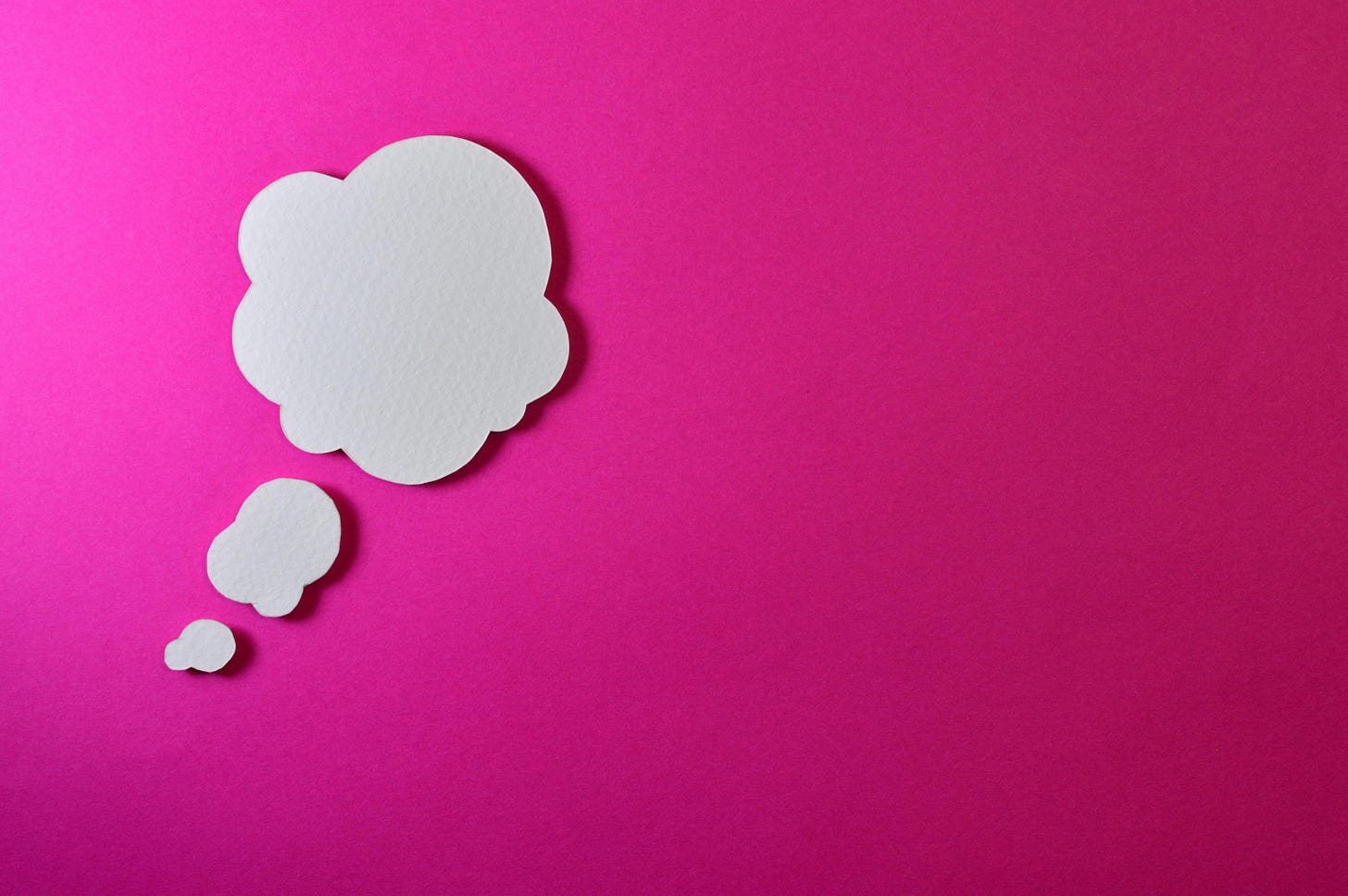

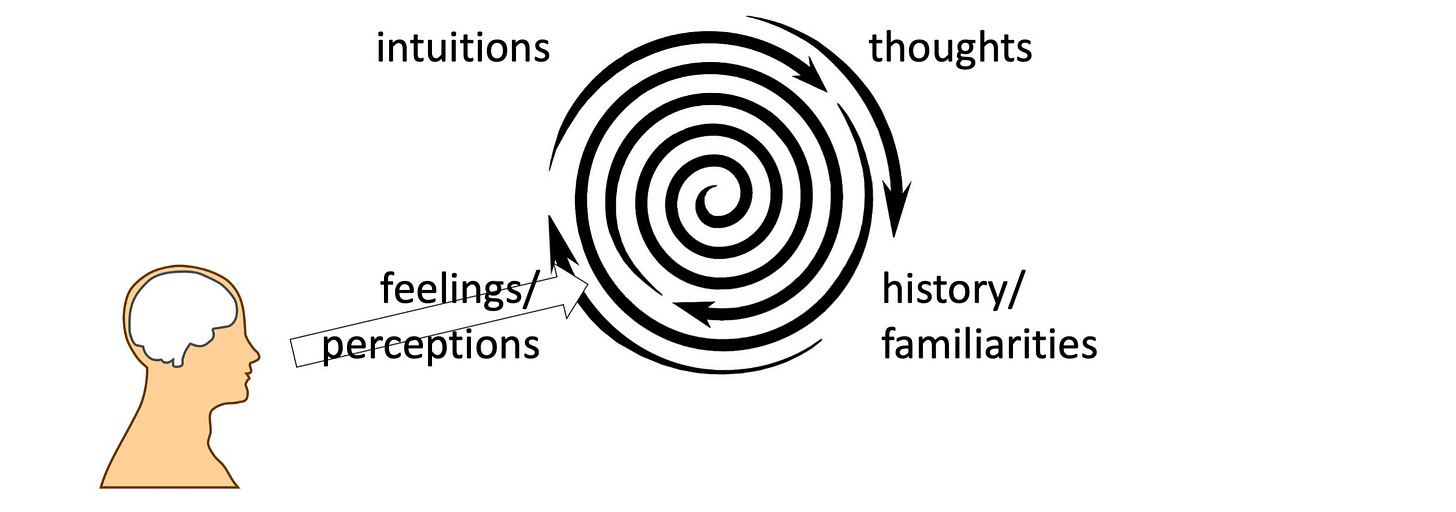
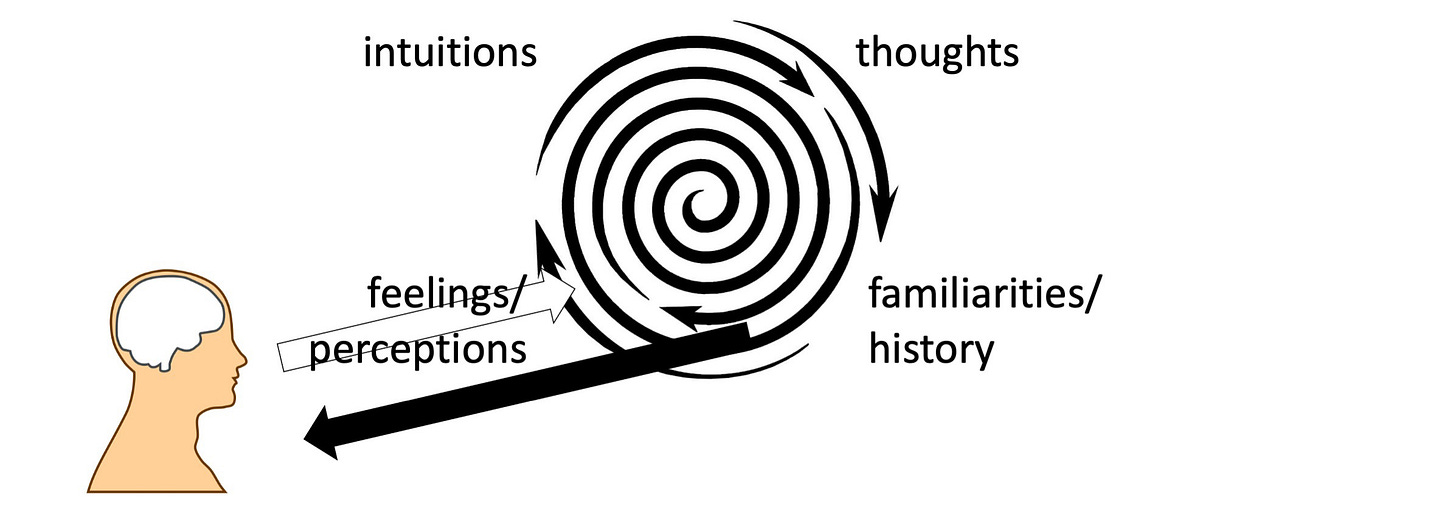
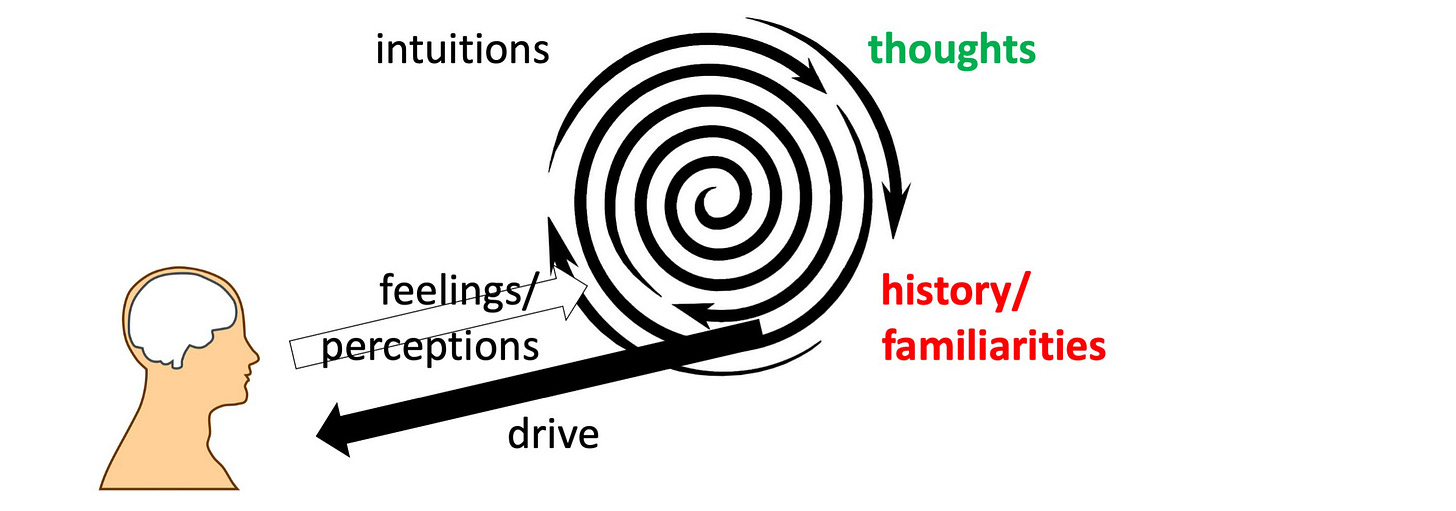
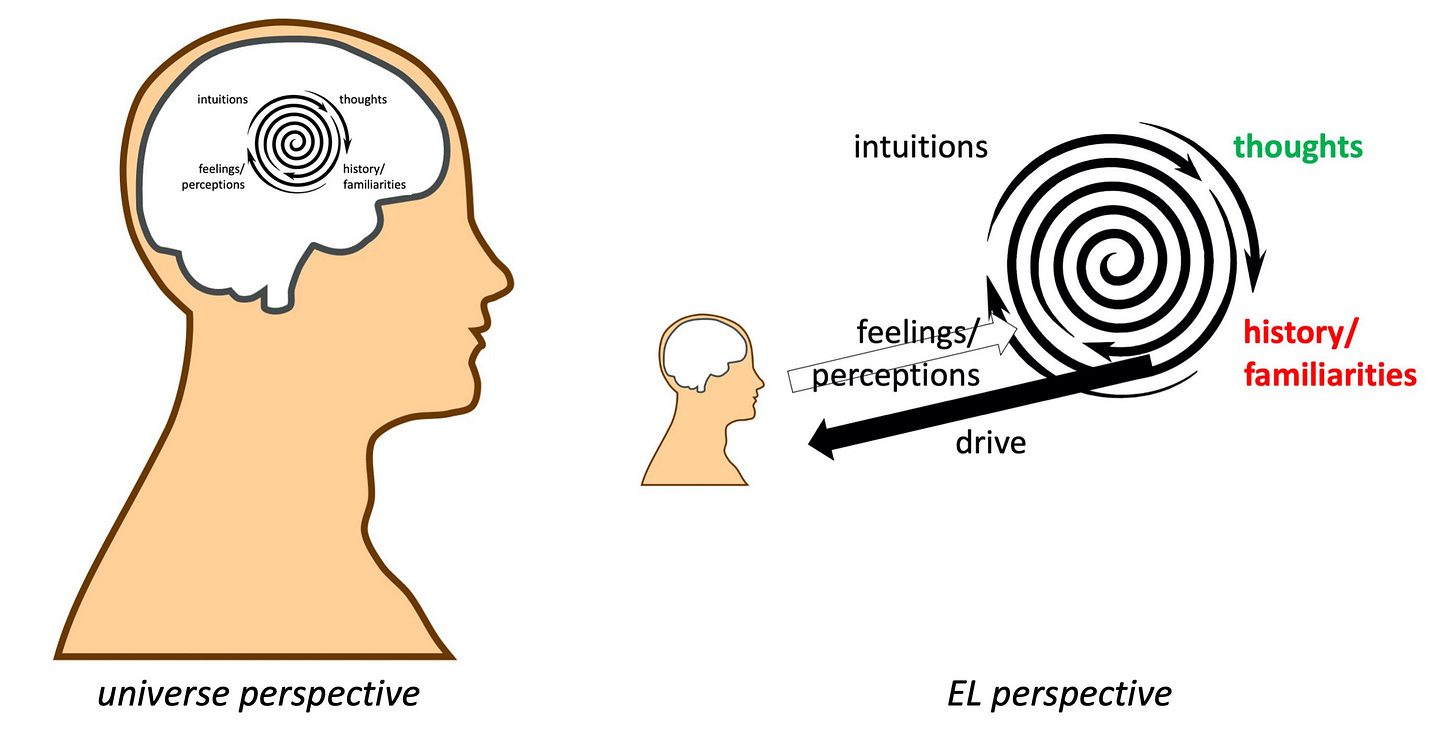
Interesting read. My experience is that thoughts become less and less the more you work through your trauma and issues.
I believe thoughts are arising when we can’t fully make sense of a situation by “feeling” / “awareness” as oneness. If you are in this state of oneness with your environment no thoughts arise. Why would you need to think when you see everything as love and the meaning behind everything.
“From the EL perspective, you are awareness driving a body.
Your brain receives thoughts and other knowings. It’s a receiver, not a transmitter. This perspective offers explanations for all known phenomena and elegantly combines science and spirituality.”
YOU MENTIONED THINKING OF A FLOWER AND YOUR CACTUS RECEIVED THAT THOUGHT TO PRODUCE A FLOWER 🌸 for you twice. Was your thought 💭 of a flower TRANSMITTED to the cactus 🌵??